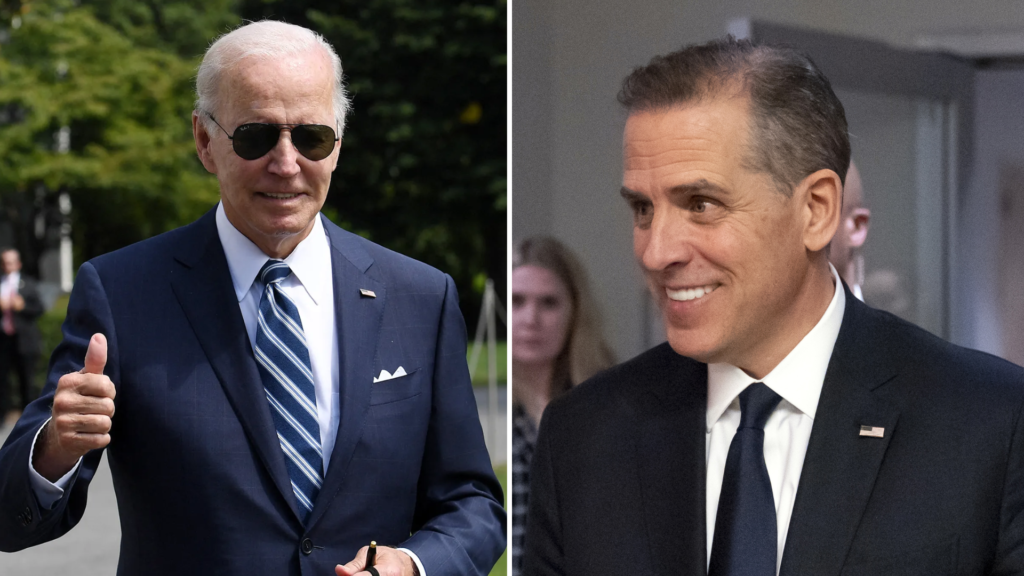
On Sunday, President Joe Biden issued a blanket pardon for his son, Hunter Biden, covering all federal crimes he may have committed between 2014 and 2024.
This action ends a contentious legal saga involving allegations of gun, tax, and other potential violations, which critics claim were mishandled by the Justice Department under Attorney General Merrick Garland.
The pardon absolves Hunter Biden of a wide range of possible federal offenses, including crimes related to drug use, lobbying, bribery, foreign agent registration, and dealings with Ukraine and other foreign entities, including China.
The timeline notably begins in 2014, the year Hunter joined the board of Ukrainian energy firm Burisma, a position that has been scrutinized for alleged influence peddling involving then-Vice President Joe Biden.
Hunter’s legal troubles include a conviction on three felony gun charges earlier in 2024. Prosecutors argued he lied on a federal gun purchase form in 2018 by claiming he was not a drug user. Jurors found him guilty of falsifying records, lying to a licensed dealer, and illegally possessing the firearm.
Additionally, Hunter pleaded guilty to tax charges earlier this year, admitting he failed to pay $1.4 million in taxes between 2016 and 2019. Prosecutors described his spending during that period as extravagant, involving escorts, luxury hotels, and a sex club membership.
The cases against Hunter Biden have drawn sharp criticism. IRS whistleblowers alleged that the Justice Department slow-walked its investigation, allowing statutes of limitations to expire on some charges.
A plea deal initially proposed by prosecutors was rejected by a Delaware judge, prompting Attorney General Garland to appoint David Weiss as special counsel. However, Weiss himself faced accusations of mishandling the case, further fueling the controversy.
Critics argue that the pardon is a political maneuver to shield Hunter Biden from further legal exposure, including testimony before Congress. Attorney Mike Davis noted that pardoning Hunter eliminates his ability to invoke the Fifth Amendment, forcing him to testify if subpoenaed. “If those pardoned refuse to testify, they can face new charges for criminal contempt,” Davis remarked.
If Biden pardons someone–like, say, Hunter or Jack Smith–they can no longer invoke the Fifth Amendment's right against self-incrimination to avoid testifying before Congress or grand juries.
— 🇺🇸 Mike Davis 🇺🇸 (@mrddmia) November 26, 2024
If those pardoned refuse to testify, they can face new charges for criminal contempt.
President Biden defended his decision in an official statement, describing the charges against Hunter as politically motivated and unjust.
He argued that Hunter’s gun charges, absent aggravating factors, would not typically result in prosecution, and that his tax offenses were resolved with restitution and penalties.
“No reasonable person who looks at the facts can conclude that Hunter wasn’t singled out because he is my son—and that is wrong,” Biden said. He emphasized that his son’s struggles with addiction and five years of sobriety were met with relentless political attacks.
Biden acknowledged the political fallout but insisted the pardon was necessary to correct a “miscarriage of justice.” “I hope Americans will understand why a father and a President would come to this decision,” he concluded.
Critics from both political parties have expressed outrage, accusing the president of undermining accountability. Supporters, however, argue that the pardon was an act of compassion and fairness.
Hunter Biden spent Thanksgiving with the president in Nantucket, a holiday overshadowed by the impending pardon announcement, which now adds another layer of controversy to the Biden presidency.
BREAKING: Joe Biden WILL pardon his son Hunter, NBC confirms, despite previously RULING OUT a pardon. pic.twitter.com/My0baMElZY
— End Wokeness (@EndWokeness) December 2, 2024

